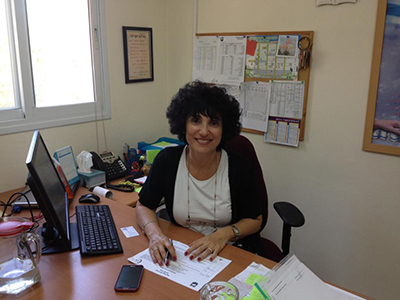August 26, 2013

Ilana Nulman had planned to go to law school at Hebrew University in her hometown of Jerusalem until she received a message in the form of marijuana.
As a singer, she was on a European tour with a group of dancers from Dimona, Israel, when she was wandering about a crowded square in Amsterdam. Someone stopped her.
“He wanted to give me hash,” Nulman related from her office at the Education Department in Ariel. “I was 20-years-old. I started to cry and said: ‘Woah. What am I doing going to law school? Maybe in a few years this will be the situation in Israel at Kikarim Square in Tel Aviv.”
It was then that she decided to switch majors to history and dedicate her life to ensuring Israel’s future through connecting Israeli children with their past.
One of Nulman’s most meaningful positions as an educator has gone into full gear this week with the start of the school year. As the new director of Ariel’s education department, Nulman will oversee Ariel’s five elementary schools and one junior high and high school. In total, Ariel’s school system serves 3,185 students.
Nulman’s own background represents the Zionist dream. Her father came on foot to mandate-Palestine from Iraq in 1926. Her mother, an émigré from Odessa to Argentina, came to Israel as a tourist. They fell in love and built their family in Israel.
Upon graduating Hebrew University, she worked as a homeroom and history teacher at a high school in Be’er Sheva. In 1991 she moved with her husband to Ariel, where they have lived ever since, raising their three children. In Ariel, she started as a grade level coordinator and a homeroom and history teacher for the local high school. From 1997-2006, she established and led Ariel’s Hayovel Junior High School as the school principal. Prior to her current post, she served as principal for the Israel Arts and Science Academy in Jerusalem, a national boarding high school for gifted students.
“I returned home to the education system in Ariel that is very dear to me,” said Nulman, speaking in English with an enthusiasm that is her hallmark. She communicates not only as an educator but an inspirational speaker. (“I always smile because it’s contagious” is one of her mottos.)
The word “mitzuyanit” has become the slogan of the education department; it’s a cross between the words “excellence” and “fulfillment” in Hebrew.
“Every human being has the choice to do the best you can in the best way you can—for yourself and for the people and community. That’s how I define excellence.”
Once a person decides to be the best, she and her team will do everything in their power to help him or her. The sacred task of educators is to believe in students—and themselves.
“When you study and learn, you make many mistakes, and it’s wonderful because you remain humble. You’re not a super person. You’re just a person. But if you decide you want to be the best, you will get there. I truly believe you have to aim very high. This is the only way to succeed.”
Fortunately, Nulman has come into a system that has already been recognized for excellence. Last year, Ariel received the National Education Prize. Nulman seeks to go from strength to greater strength, with concrete plans for realizing her vision of “mitzuyanut.”
She and her team are working closely with Ariel University to introduce new academic programs. These include programs in the fields of visual arts, theater, and music for the junior high and programs in biotechnology or cyber-technology for the high school. She’d like to see each elementary school in Ariel have its own “color,” a unique characteristic or strength, whether it be art, science, language, or culture.
She envisions 30 percent growth over the next five years, with Ariel schools the coveted choice for families in surrounding communities.
A field that is close to her heart is special education, and she would like to establish a school for special education in Ariel one day.
Her 24-year-old daughter suffers from severe Tourette’s syndrome, obsessive compulsive disorder, and sensory defensiveness. Nulman has recently completed a book on the insights she gained as a mother raising a child with special needs.
“She’s a gift. I’m sure I’m a better person because of her.”
In fact, when asked what she is most proud of in her career, she responded: “First of all, being a mother.”
Professionally, she has no regrets since that encounter in Amsterdam. “I chose to be an educator. I’m so happy. This is exactly what I have to do in my life.”